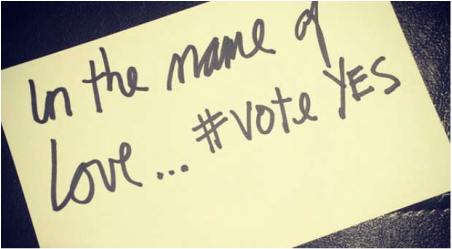 The rock band U2 posted an Instagram note in support of same-sex “marriage” in Ireland’s recent referendum. The note said, “In the name of love vote yes.” The phrase is a reference to their song “Pride (in the Name of Love)” which is supposed to be about the life and death of Jesus Christ. Three members of the band (Bono, The Edge, and Larry Mullen, Jr.) profess to be Christians and have a great influence in evangelicalism, the emerging church, and the contemporary worship movement. Phil Johnson calls Bono “the chief theologian of the Emerging Church Movement” (Absolutely Not! Exposing the Post-modern Errors of the Emerging Church, p. 9). Eugene Peterson, author of The Message, says that Bono is a prophet like John the Baptist (foreword to Get Up Off Your Knees: Preaching the U2 Catalog). Brian McLaren and Tony Campolo say that Bono is moving the world toward the kingdom of God (Adventures in Missing the Point, 2003, pp. 50, 51). Bill Hybels interviewed Bono at Willowcreek Community Church’s Leadership Summit in 2006, and Rick Warren invited Bono to Saddleback Church to help launch his P.E.A.C.E. program. But when judged biblically, U2 is destitute of spiritual truth, and the fact that the band is wildly popular with contemporary Christians is a fulfillment of the apostasy described in 2 Timothy 4:3-4. Joseph Schimmel observes that “Bono has led people into a version of Christianity that is slippery, undefinable, and liberal (The Submerging Church, DVD, 2012). The members of U2 rarely attend church, and “Sundays find them in a pub rather than in a pew” (U2: The Rolling Stone Files, p. 14). In a wide-ranging interview with music reporter Michka Assayas, Bono never gives a scriptural testimony of having been born again (Bono on Bono). Bono says that he believes Jesus is the Messiah and that He died on the cross for his sins and that “he is holding out for grace,” but Bono’s “grace” is a grace that does not result in radical conversion and a new way of life. It is a grace without repentance, a grace that does not produce holiness. Nowhere does he warn his myriads of listeners to turn to Christ before it is too late and before they pass from this life into eternal hell. In fact, the only thing he says about heaven or hell is that both are on earth (Bono on Bono, p. 254). The members of U2 do not believe Christianity should have rules and regulations. “I’m really interested in and influenced by the spiritual side of Christianity, rather than the legislative side, the rules and regulations” (The Edge,U2: The Rolling Stone Files, p. 21). Yet there are more than 80 specific commandments in the book of Ephesians alone, the same book that says we are saved by grace without works. Though salvation is by grace, it always produces a zeal for holiness and obedience to God’s commands, for we are “saved unto good works” (Ephesians 2:8-10). According to Titus 2, the grace of God teaches the believer to deny ungodliness and worldly lusts and to live soberly, righteously, and godly in this present world. Bono says that the older he gets the more comfort he finds in Roman Catholicism (Bono on Bono, p. 201). Though he speaks positively of Romanism, Bono has nothing good to say about “fundamentalism,” falsely claiming that it is a denial that God is love (Bono on Bono, p. 167) and calling it vile names (p. 147). Bono defines love by the rock & roll dictionary rather than by the Bible, which says, “For this is the love of God, that we keep his commandments: and his commandments are not grievous” (1 John 5:3). (Friday Church News Notes, May 29, 2015, www.wayoflife.org, [email protected], 866-295-4143) Comments are closed.
|
Archives
February 2020
|
Ads do not imply endorsement | Policy/Terms of Service | About Us | Contact Us | © Life Work Academy, Inc.
 RSS Feed
RSS Feed

